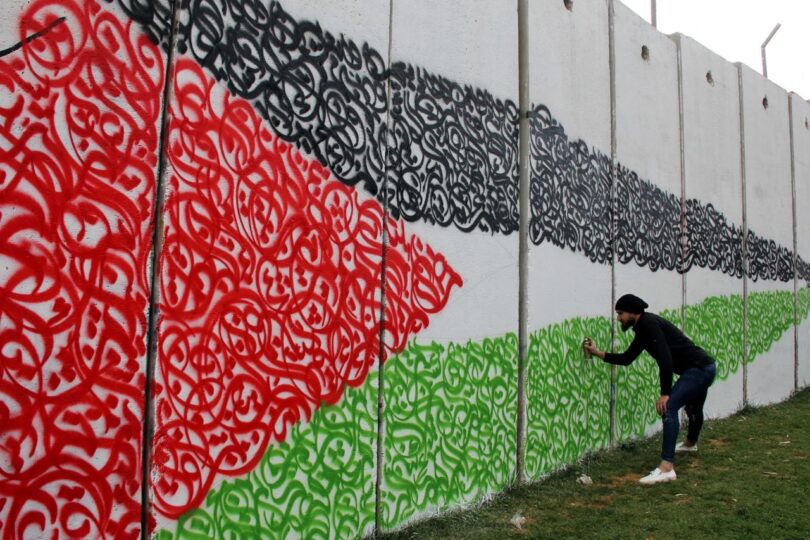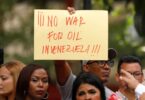Note from the author: I want to underscore my profound dismay at the starkly unequal portrayal of this conflict in both Western and global media, as well as the Western response and support for Israel’s actions in Gaza. It is undeniable that Hamas’ actions are horrendous and must be unequivocally condemned as war crimes.
Hamas is an extremist organization and its attacks over the weekend are unspeakable. At the same time, Israel’s extensive destruction of the Gaza Strip, resulting in countless civilian casualties, the bombing of schools and hospitals, and the imposition of a blockade that denies access to food, medicine, and electricity in an already occupied region, is equally reprehensible as a war crime.
What is especially distressing is how politicians in the EU and the US, along with a global media seemingly devoid of journalistic integrity, appear to selectively label actions as war crimes based on their political interests. Human rights and international law seem to be applied selectively by Western countries in accordance with the interests of their ruling elites. Palestinian lives, including the tragic deaths of numerous children and infants, continue to be overshadowed and reduced to mere statistics. The EU and the US bear a grave responsibility for essentially giving a green light to the far-right Israeli government to carry out what amounts to ethnic cleansing of Palestinians, unfolding before our very eyes.
The recent developments in the Middle East, marked by horrifying acts of violence perpetrated by Hamas[1][2][3] against Israeli civilians and the subsequent relentless bombardment of Gaza, ‘an open-air prison’ where more than two million Palestinians live in conditions of apartheid[4] , at the relentless mercy of IDF soldiers and the Israeli regime, have ignited urgent apprehensions about an impending military escalation and the devastating humanitarian fallout it could entail. The conflict between Israel and Palestine goes back to the late 19th century and it started with a European power, the British Empire, promising the Zionist movement – aiming to establish a homeland for Jewish people – a country in the territory inhabited mainly by Palestinian Arabs and other minorities such as Jews, Christians, Bedouins and Druze. In the subsequent decades, marked by horrifying bloodbaths, Israeli settlers have pushed out or annihilated Palestinians through displacement, demolishing of their homes, and creation of new Israeli settlements[5].
Today, the Palestinian Arabs who still reside in the pre-1948 territory of Palestine live in the occupied West Bank, Gaza Strip, and East Jerusalem under the conditions of complete surveillance, complete control of water, food, and electricity by the Israeli army and government, and subject to human rights violations[6]. Many scholars have referred to Israel’s actions against Palestinians as ethnic cleansing[7][8].
The conflict has been framed by Jewish and Palestinian radicalists as ‘an existential conflict’ between two people claiming the same territory as a national homeland. The radical stance on each side claims that one cannot exist while the other does. In other words, both extreme-right Zionists and Palestinian Islamists de-humanize ‘the other’ and call for their annihilation. The Jewish claim to the ‘Promised Land’ can be traced back to European pogroms, the growing pressure on the Jewish population to fully assimilate within the emerging national movements, and the horrors of the Holocaust. Feeling that they had no rights if they did not have a state, the followers of the Zionist movement emerged to create a state of Israel to ensure the protection of the rights of Jewish people. Throughout the subsequent decades and the colonization of Palestine, Zionism nationalized Judaism, claiming that Palestine is a land only for Jews and that Palestinian Arabs are ‘strangers’. On the other hand, Palestinian Arabs claim that Palestinians are indigenous to the region and have been living on their land since the Roman Empire [9].
The Jewish population has moved on their historic lands claiming they were empty (the narrative of ‘empty lands’ has been used by European settlers in the Americas while committing genocide against indigenous peoples) and has engaged in a strategy of conquest and annihilation, actively killing or creating conditions unsuitable for decent living for Palestinians. The two narratives are inherently conflicting, yet they do have in common: the struggle to match ‘people-territory-state’.
The intensifying violence and the pressure to align with one side in the midst of fervent nationalist fundamentalism[10] on both ends, where each claims the right to self-defense by obliterating the other, not only devalues the humanity of those trapped amidst the bombardment but also underscores how nation-states or aspiring national movements must continually affirm their existence and legitimacy by excluding those categorized as “the other,” the non-nationals. Consequently, the ceaseless cycle of violence in this conflict starkly illustrates the core principles of the nation-state paradigm: territorial disputes and national identities are prioritized at the expense of human lives and enduring peace.
National Awakenings: When the Nation Conquered the State
The nation-state as it emerged after the French Revolution is the combination of two elements that in the 18th century were still separate: state and nationality. The state apparatus was established as a legal institution, sworn to protect the rights of everyone falling under its jurisdiction. But in the late 19th century and 20th century, national awakenings tore through societies, dividing and ethnicizing populations through violence and education.
Nations came to be when people gained a collective consciousness as common cultural and historical entities and that their territory was a permanent home. French philosopher Etienne Balibar writes that nations find their foundation in what he terms as ‘fictive ethnicity’. Ethnicity he argues is an essentialist construction suggesting that individuals inherit a unique blend of biological and spiritual substance that binds them to a particular community, while also distinguishing them from ‘others’[11].
In this sense, nationalism has a strong affinity with eugenism and rests on the condition of population homogeneity.
Hannah Arendt famously refers to this process of national emancipation as ‘the nation conquering the state’, implying that states were now functioning to safeguard ‘national’ interests, that nationals came before humans, and that only nationals could be citizens [12].
This new social and political organization, the nation-state, is premised on at least two conditions: homogeneity of the population and rootedness in the soil. Now, the nation-state principle could barely work in countries with established national traditions (e.g. France, Germany) where minority populations had to choose between full assimilation or exile, so how could it function in regions characterized by demographic diversity such as the Balkans, Eastern Europe, or today’s Palestine? These areas, vestiges of the Roman, Ottoman, and Russian empires, were marked by linguistic plurality, religious diversity, and identities that transcended the confines of the nation.
In the aftermath of WW1 and the disintegration of the last continental empires, new nation-states emerged in Central and Eastern Europe, as well as the Middle East, particularly vulnerable to violence due to a lack of ‘national homogeneity’ as a pre-condition for the establishment of the nation-state. Some groups sought to homogenize these states by promoting their own national identities, while others found themselves categorized as ‘national minorities’ and came under the protection of Minorities Treaties. The most notable outcome was the institutionalization and consolidation of what was already implicit within the nation-state system: the acknowledgment that minorities not only coexist within nation-states but also require an external entity, beyond the nation-state, to safeguard their rights and well-being. It effectively recognizes the nation-state as an inherently violent institution organized around division, classifications, and borders. Membership in a nation-state, whether through passports, welfare rights, or voting privileges, inherently excludes those who do not share the same nation-state affiliation[13].
The tragedy, writes Hannah Arendt, is that nationally frustrated populations, oppressed by the new state were convinced that ‘true freedom, true emancipation, and true popular sovereignty could be attained only with full national emancipation, that people without their own national government were deprived of human rights’ (p. 356). In the 20th century, colonized peoples initiated movements to challenge imperial oppression, primarily by asserting their right to self-determination through national claims. This legacy persists in contemporary struggles, such as the decade-long, ongoing Palestinian-Israeli conflict. Palestinians, faced with international indifference to Israeli state war crimes, increasingly view the establishment of a Palestinian nation-state as their only path to liberation from Israeli settlers.
Limitations of Nation-States: Lack of Political Imagination and Perpetuation of Violence
The grim realities of the modern era and the bloodshed underpinning the dominance of nation-states are rooted in the notion that national emancipation necessitates violence. In revisiting the insights of Hannah Arendt, it becomes evident that the peril of national emancipation lies in the fact that the purported freedom of the nation is not synonymous with the freedom of all its inhabitants; instead, it often rests on the subjugation and oppression of those labeled as different or belonging to the ‘Other.’ In this complex landscape, migrants, refugees, minorities, the displaced, and stateless individuals will always find themselves in a perpetual state of precarity. The nation-state’s modus operandi, as outlined by Zygmunt Bauman, centers on an ongoing struggle against unfamiliarity and ‘strangeness’[14].
This strategy requires a continuous reinvention of the nation-state’s identity and purpose, often culminating in two distinct yet interrelated approaches. Firstly, the ‘anthropophagic’ approach seeks to enforce assimilation by erasing all traces of ‘otherness.’ This process entails measures such as language erosion and the suppression of non-conforming traditions, aiming to homogenize the population under the banner of the nation-state. Secondly, the ‘anthropoemic’ strategy revolves around exclusion, marginalization, confinement, and at times, even physical elimination. These tactics are employed to maintain the boundaries of the nation-state, ensuring that those who do not fit the mold are kept at bay or removed altogether.
The tragedy is that the nation has become a trans-historical truth. Even those who acknowledge that nations have formed through particular historical events, celebrate it is as an ideal historical achievement and political project that needs to be protected, nurtured, and refined. The idea of a nation has ingrained itself so deeply in our collective consciousness that we unquestioningly accept it as the sole legitimate form of political organization for societies. This acceptance has normalized the idea that borders are the standard means of distinguishing between desirable and undesirable individuals, allowing state surveillance to permeate our daily lives. It has eroded the right to mobility, subjecting it to violation by militarized state institutions, while compelling people to conform to the national narratives dictated by political elites.
In this stark reality, xenophobia and racism find acceptance, and civilian casualties are deemed permissible in the pursuit of so-called ‘national interests.’ We find ourselves living in times marked by a chilling descent into brutality, where, in the aftermath of the 20th-century massacres, we continue to engage in conflict with ever-more sophisticated military technology. These disturbing trends underscore the urgency of critically examining the unquestioned dominance of the nation-state and its consequences for our world today.
Returning to the enduring Israel-Palestine conflict, we are confronted with the undeniable and harsh reality that the root cause of this turmoil lies in the pursuit of nation-state aspirations. On one side of this bitter divide, Israel’s journey toward nationhood has been marred by the violent expulsion, marginalization, and, at times, the annihilation of Palestinian Arabs. For decades, Palestinians have endured the hardships of occupation, left to grapple with their despair while the global community often remained passive and seemingly oblivious to their plight.
On the other end, largely due to the violence perpetrated by the far-right, Zionist regime, Palestinians have come to believe that their path to achieving basic rights, freedom, and recognition as equally valuable human beings hinges on the establishment of their own internationally recognized nation-state. The recent wave of hostilities and violence, however, experienced by both Israelis and Palestinians, has cast doubt on the viability of the two-state solution as a means of resolving this deeply entrenched conflict. One key reason for this skepticism lies in the persistent risk of territorial and identity-based disputes. The historical grievances and injustices experienced by both Israelis and Palestinians have created a complex web of competing claims, which are exacerbated by ongoing settlement activities and the entrenchment of divisive narratives. These factors make it increasingly challenging to delineate clear and mutually acceptable borders, as well as to address issues such as the right of return for Palestinian refugees and the status of Jerusalem.
What is urgently needed is a pathway for people on both sides to collectively grieve, reconcile, and seek justice as human beings, transcending the confines of national identities. Only by transcending the narrow framework of the nation-state can we begin to foster the conditions necessary for lasting peace and a future where both Israelis and Palestinians can coexist in harmony.
What could be the potential reconciliations?
Reassessing the options for the Israeli-Palestinian conflict, the two-state solution is not only difficult to achieve, but also lacking in vision and political creativity. This approach is called into question in the long run because nation-states form and evolve through violence. The Oslo Accords established the Palestinian Authority as an early stage of statehood, but this approach was never intended to establish a Palestinian state or achieve lasting peace[15][16].
Given the significant support from Western powers for the highly militarized Israel, including its nuclear capabilities, the balance of power and international representation is evidently skewed.
In the context where the two-state solution is becoming less and less viable, what is there left to do?
I advance two solutions.
The one-state solution, be it in the form of a federation, a democratic unitary state or a binational state
where Palestinians and Israelis coexist as citizens with equal rights and political power, cannot be discarded. Palestinian activist Edward Said wrote: “…after 50 years of Israeli history, classical Zionism has offered no solution to the Palestinian presence. Therefore, I see no other way than to start discussing the sharing of the territory that brought us together, let’s share it in a truly democratic way, with equal rights for all citizens”[17]. This approach proposes to overcome obstacles related to national identities and historical claims by creating a state entity in which all inhabitants, regardless of their ethnic or religious origin, have equal rights and representation.
Considering the carnage that has been going on for a week already, it is difficult for me to imagine how this reconciliation could take place. However, as Yanis Varoufakis says: “It is the unique historical suffering of the last two centuries endured by both Jews and Palestinian Arabs – marked by racism, the Holocaust, concentration camps, abuse, violence and prolonged oppression – that would could create the common ground necessary to unite and reconcile these two peoples”[18].
The No State Solution.
For too long, scholars have become accustomed to confining their imaginations to the narrow framework of methodological nationalism[19], viewing the nation-state as an unquestionable and a stable given. Just as in the past the nation-state represented a political vision and a project for liberation from the tyranny of monarchy and colonialism, today we need, more than ever, as academics, scientists and thinkers to seek a new political vision and a project to help us escape the tyranny of nation-states.
The anarchist approach argues that liberation from the constraints of the state system resides in the abolition of capitalism, cemented into the very structure and foundation of the nation-state. By promoting working class internationalism, workers in Palestine, Israel and throughout the region can join forces to challenge the dominance of the capitalist class, collectively break the chains of oppression and lay the foundation for a new order founded on the principles of solidarity, freedom and equality[20].
The reconsideration and further development of anarcho-syndicalist principles[21]– decentralization, mutualism and voluntary cooperation – offers a perspective for the creation of a society outside the influence of the state. In this view, political power can be distributed among smaller communities, voluntary cooperatives or associations, emphasizing direct decision-making and self-governance through voluntary cooperation and mutual respect. Likewise, in the economic realm, mutualism could contribute to a more equitable distribution of resources, protecting against the exploitation perpetuated by traditional capitalist institutions. Moreover, by promoting voluntary cooperation and solidarity within communities and associations, the anarchist vision places autonomy, equity and solidarity as basic principles of society.
While it may appear as an unattainable utopia, painfully distant from the cruel ongoing realities on the ground, this vision primarily serves as a political aspiration and a foundational step toward a fairer and more compassionate future. Every utopian vision demands deeper contemplation and heightened political dedication to transform it into a feasible reality. It’s disheartening to witness the immense emphasis on scientific and technological advancements, juxtaposed with a societal and political landscape that often resembles primitive conflicts with more and more advanced weaponry. So why not think beyond the limited confines of the nation-state? Commencing with these fundamental principles of freedom and solidarity, exploring and developing them with scholarly vision and unwavering political commitment, we might just have a grain of hope left.
REFERENCES:
[1] Hamas is an Islamist, political and militant organization founded as an offshoot of Egypt’s Muslim Brotherhood that aims to establish an Islamic state in the historic lands of Palestine. It is deemed a terrorist organization by many countries around the world, including the EU, Canada, Israel and the US. Hamas is not representative of the Palestinian people.
[2] Farsakh, L. (2011). The One-State Solution and the Israeli-Palestinian Conflict: Palestinian Challenges and Prospects. Middle East Journal, 65(1), 55–71.
[3] https://www.aljazeera.com/program/newsfeed/2023/10/10/what-is-the-armed-palestinian-group-hamas-2
[4] https://www.amnesty.org/en/location/middle-east-and-north-africa/israel-and-occupied-palestinian-territories/report-israel-and-occupied-palestinian-territories/
[5] https://sites.uab.edu/humanrights/tag/palestine/
[6] https://www.amnesty.org/en/latest/campaigns/2017/06/israel-occupation-50-years-of-dispossession/
[7] Pappé, I. (2007). The ethnic cleansing of Palestine (Paperback ed). Oneworld.
[8] Khalidi, R. (2010). Palestinian identity: The construction of modern national consciousness. Columbia University Press.
[9] Hammer, J. (2005). Palestinians born in exile: Diaspora and the search for a homeland (1st ed). University of Texas Press.
[10] https://www.project-syndicate.org/commentary/israel-palestine-hamas-and-hardliners-against-peace-by-slavoj-zizek-2023-10
[11] Balibar, E. (1990). The Nation Form: History and Ideology. Review (Fernand Braudel Center), 13(3), 329–361.
[12] Arendt, H. (2017). _The Origins of Totalitarianism_. Penguin UK.
[13] Valluvan, S. (2019). Theorising the nation. In _The clamour of nationalism: Race and nation in twenty-first-century Britain_ (pp. 28–56). Manchester University Press.
[14] Bauman, Z. (1995). Making and Unmaking of Strangers. _Thesis Eleven_, _43_(1), 1–16.
[15] Roy, S. (1999). De-development Revisited: Palestinian Economy and Society Since Oslo. Journal of Palestine Studies, 28 (3), 64–82.
[16] Pace, M., & Sen, S. (2019). The Palestinian Authority in the West Bank: The theatrics of woeful statecraft. Routledge/Taylor & Francis Group.
[17] http://www.miftah.org/Display.cfm?DocId=16582&CategoryId=5
[18] https://www.youtube.com/watch?v=i-ZXE24uiW8
[19] Anderson, B. (2019). New directions in migration studies: Towards methodological de-nationalism. Comparative Migration Studies, 7(1), 36.
[20] https://theanarchistlibrary.org/library/melbourne-anarchist-communist-group-palestine-no-state-solution
[21] https://www.marxists.org/reference/archive/rocker-rudolf/misc/anarchism-anarcho-syndicalism.htm#s5
Featured image: An artist draws the Palestinian flag on a wall on the southern Lebanese border with Israel near Fatima’s Gate on December 17, 2017.Ali Dia/AFP via Getty Images









